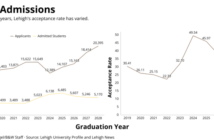
Sarah Epstein
Late last month, the FBI released findings from a two-year investigation into college basketball.
The NCAA scandal focused on mass corruption, bribery and fraud in relation to illegal recruitment practices.
The criminal complaint states, “the investigation has revealed…a scheme involving significant cash payments by athlete advisers, and executives of at least one athletic apparel company, to the families of high-school student athletes, at the request of basketball coaches at two NCAA Division I universities, in exchange for agreements by those athletes to attend the universities and later to sign with the advisers and apparel company who made the bribes.”
The release of this bombshell investigation brings up the age-old question of college sports: should student athletes be paid?
The argument has been going on for quite some time. Those in favor of keeping the system in place argue student athletes are students first, athletes second.
The other side argues paying student athletes during their college years is equivalent to business students being paid for an accounting internship. Players are training for their professional careers in the same way students are training at a Big Four company to become professionals.
A compromise for this debate could be to pay athletes for their junior and senior seasons based on their performance, similar to the internships students accept in their upperclassmen years.
Why are students currently allowed to accept a salary from KPMG but not a sponsorship deal from Nike?
The average starting salary for Lehigh students in the College of Business and Economics after graduation is $58,268. The average hourly wage for a business intern who had completed their sophomore year was $16.26 in 2012, according to the National Association of Colleges and Employers. On average, interns make 8 percent of their starting salary based on a 30-hour work week in a 10-week program.
Let’s apply that percentage to athletes. In 2013, Lehigh alum CJ McCollum, ’13, made $2.32 million in his rookie season, his first post-graduation job. If McCollum had been paid in college, his 8 percent salary would equate to $185,600. That number is close to the fines paid by the NCAA in the cases of fraud, bribery and mass corruption.
The NCAA is able to profit from broadcast partners and sponsorships, and broadcast networks are able to earn advertising revenue, while the student athletes themselves are the reason the billion-dollar industry exists. Even so, the athletes are the only ones to walk away with no monetary gains to show for their hard work.
ESPN college basketball analyst Jay Bilas said he thinks it is unfair student athletes are treated differently from other students primarily studying subjects like engineering or taking paid internships.
“In any facet of college life, only one class of people have any financial restriction on them at all and that’s athletes,” Bilas said. “So the idea that it’s based on education is a lie. No other student is told what they can and cannot make, and if it affects their education, or scholarship, or anything.”
If student athletes were paid for their work, the NCAA scandal wouldn’t have happened.
The FBI’s findings shed light on corruption in the recruitment process for high school athletes. Countless hours are spent researching, visiting and communicating with schools. Recruiters put together highlight reels to post on YouTube and attend tournament after tournament with club teams.
The process often starts well before athletes even reach high school age. The NCAA recently approved a proposal that would prevent school representatives from contacting prospective men’s and women’s lacrosse recruits until Sept. 1 of their junior year. The change came after middle-schoolers began verbally committing to colleges, putting too much pressure on young teenagers who usually don’t sign national letters of intent.
As the FBI investigation showed, most high-profile sports’ recruiting processes have much more pressure than just making decisions at a young age.
The investigation alleges an assistant basketball coach at Louisville paid $100,000 for a recruit, Brian Bowen, under the condition that he sign with the university. Since the investigation was released, Bowen has been suspended indefinitely from playing basketball at Louisville. Athletes cannot accept money, gifts or sponsorship deals. If they do, they risk their NCAA eligibility.
This promising young athlete, who is currently still in high school, is being forced out of a game in which he could one day call a career. Yes, he broke the NCAA’s rules, and for that he should be punished. If the rules were different, Bowen would still be committed to Louisville and would likely have a long career ahead of him. Student athletes work just as hard, if not harder, than other students at their respective universities.
This scandal cannot be blamed on athletes. The NCAA has to hear the pleas of countless student athletes and change its rules for player compensation. Athletes deserve the same treatment as their peers.
After all, they’re students, just like everyone else. They should be treated as such.
—
Sarah Epstein, ’19, is an associate photo editor for The Brown and White. She can be reached at [email protected].





Comment policy
Comments posted to The Brown and White website are reviewed by a moderator before being approved. Incendiary speech or harassing language, including comments targeted at individuals, may be deemed unacceptable and not published. Spam and other soliciting will also be declined.
The Brown and White also reserves the right to not publish entirely anonymous comments.